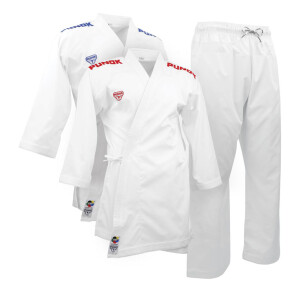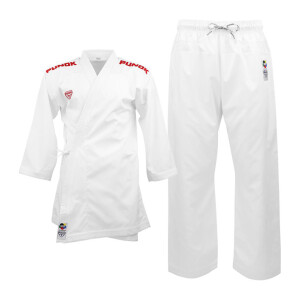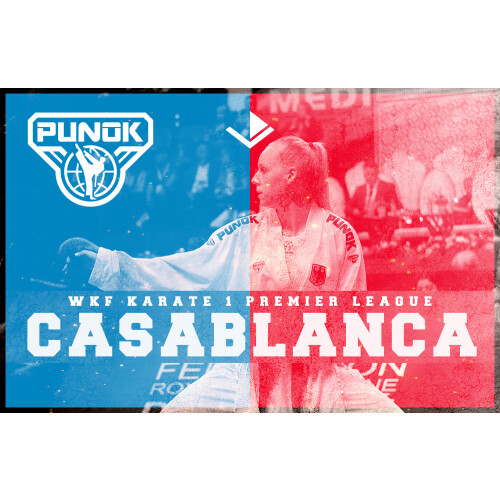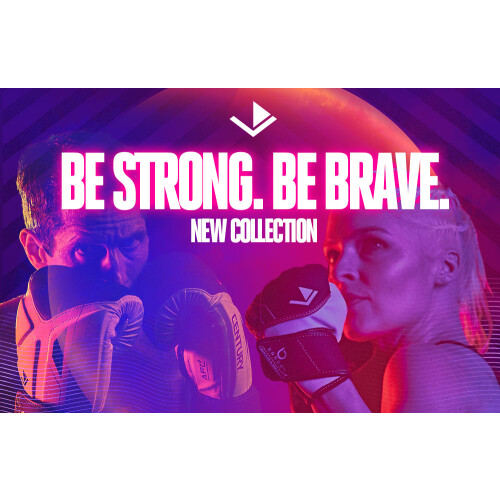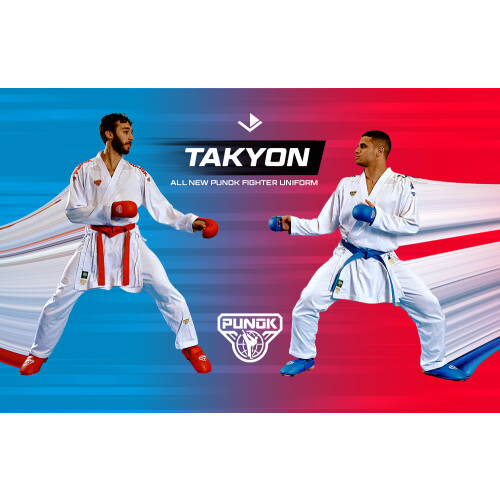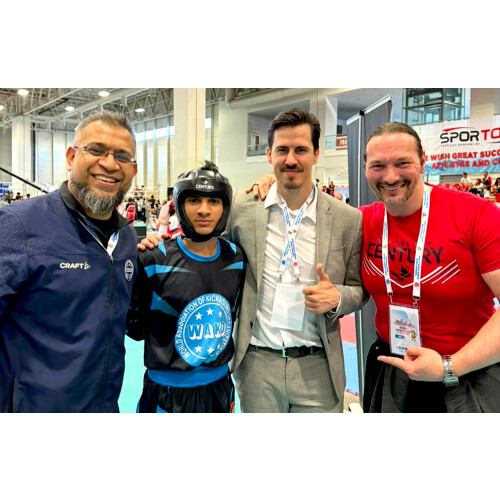Interview with our PUNOK brand ambassador Imane Valk
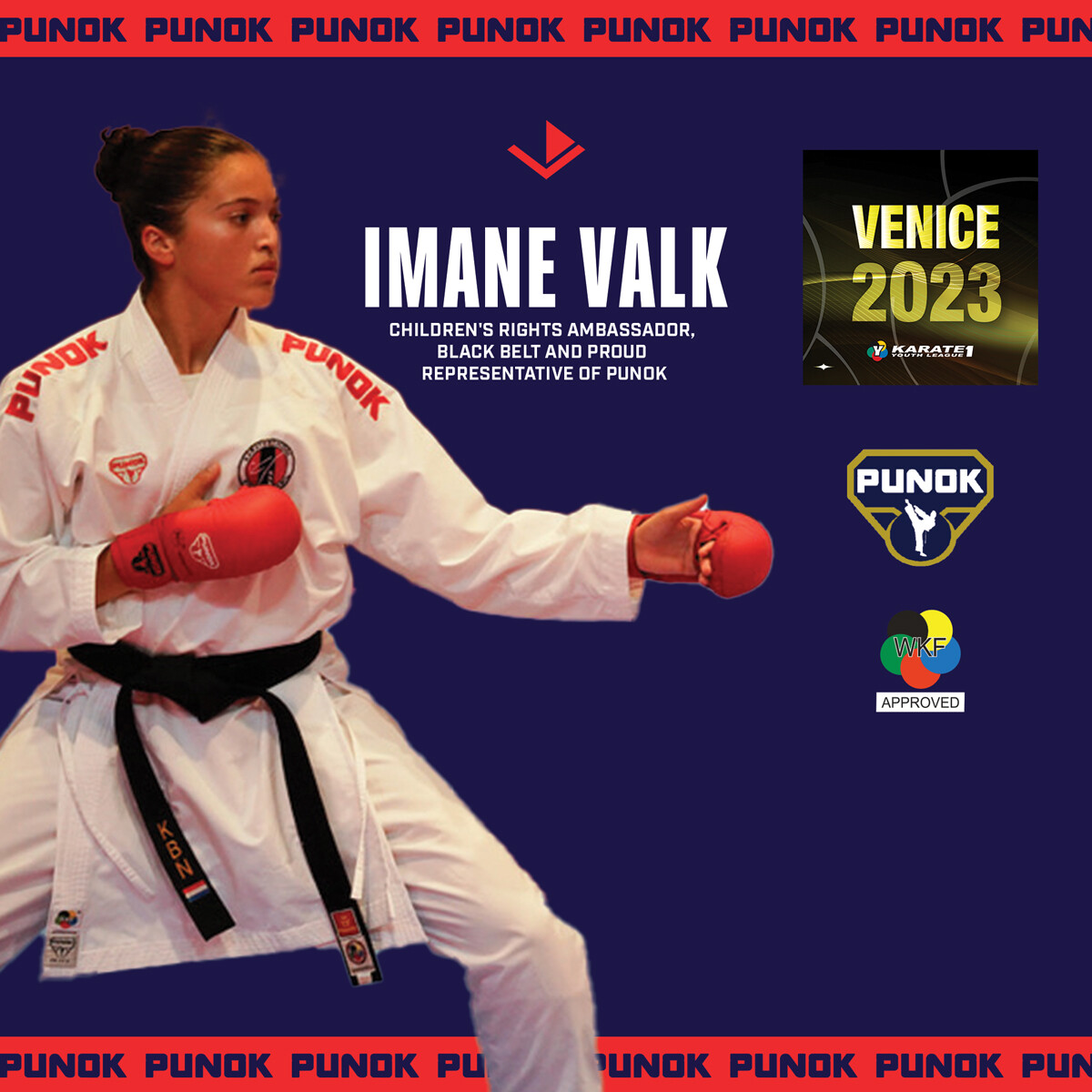
Brand ambassador Imane Valk exclusively in an interview
The successful martial artist talks about her goals, wishes, family, and why her life motto is 'If you can dream it, you can do it'...
What significance does martial arts have in your life?
"For me, martial arts is not just a sport that I practice. It's a way of life. Every morning, I wake up as a karateka, and every evening, I go to bed as a karateka. In my daily life, I respect the values of a Budo martial artist, whether I'm on or off the Tatami."
Who introduced you to martial arts?
"I was almost ten years old when I started practicing martial arts. I saw a feature about it on television that piqued my curiosity. After my first karate class, I immediately fell in love with the sport. When my former club stopped training, I switched to the Fightin' Nabil Karate school. My goal was to participate in Kumite competitions and achieve the black belt. I was selected to participate in competitions shortly before the COVID-19 crisis, so my Kumite karate journey unfortunately began with a lot of online training and tournaments. But looking back, I think they really helped me improve my techniques. Now I am part of the Dutch Karate national team. And last December, I received my first Dan. Many people ask me why I combine traditional karate and competitions. For me, it's quite natural. I love to fight, but sometimes my curiosity wants more. For me, that means returning to the 'Do' of Karate-Do, the path of my passion."
What role do your parents play in your athletic development?
"My mother is my biggest support; we live together. She is always there for me when I have to go to training, training camps, or competitions. My mother supports me in every way: mentally, financially, and practically. But since karate has its costs, I also contribute to the financial part myself. I work 16 hours a week to be able to travel to tournaments and training camps abroad."
What does Kumite mean to you?
"Kumite is respect, inner drive, motivation, and concentration. It's about getting better than yesterday, every day, over and over again."
What has been your greatest athletic success?
"I was one of the last 16 fighters at the K1 Youth League in Poreč. And I finished 11th at the K1 Youth League in Cyprus. I am still working on getting better, step by step. At the moment, I am grateful that I can compete at the highest level."
What are your athletic goals?
"I want to become a world champion. And I hope that karate will become an Olympic sport again, and I can participate."
What is your life motto?
"I actually have two life mottos. The first is: 'If you can dream it, you can do it.' I believe that if you have a dream, focus on it, and work hard for it, you can achieve it. At the same time, I also recognize that sometimes you have to adapt. Hence my second life quote: 'The journey is the destination.' It's about accepting, appreciating, and embracing everything that comes along the way."
What other passions do you have? Where do you draw energy for sports?
"With everything I do, I want to make a difference. I don't like meaningless things. That's why I focus on my goals and dreams as an athlete and as a person in life. I am very grateful that I can do that. I realize daily that being able to dream is not something granted in this unequal world. That's why I advocate for justice and equal opportunities, especially for children. That's why I became a children's rights ambassador for a non-profit organization. We help the most vulnerable children expand their horizons so they can dream big. That's what gives me energy. Not just focusing on myself but also helping others in difficult situations."
How do you physically and mentally prepare for important tournaments?
"I am in a special sports class where only athletes who compete in various sports at an international level are. From ice skating to golf and basketball to wall climbing. When it comes to sports, we all share the same dream: we want to become the best in our field. My school supports me a lot in this. I have less class time, more time for self-study, and when I have to go to training camps or tournaments, everything is allowed. I train about fifteen hours a week to be physically prepared. Kumite, plyometrics, and in the gym. As for the mental part, I always analyze my previous fights. And before I step onto the Tatami, I visualize my fight or fights. Then I know what my plan and goal are."
What do you think about the quality of PUNOK products from Century Martial Arts?
"I think the quality of PUNOK products is very high. As a girl, I really like that the karate gi's are thick and thin at the same time. When I train or fight in them, the gi feels thin, but it's not see-through. Also, the shin guards have an additional red layer underneath so they don't turn white when you train or fight a lot. But more importantly for me is that the story of PUNOK really resonates with me as a person. The story is about giving athletes the opportunity to practice the sport they love. That's why PUNOK is more affordable than other brands on the market. And that aligns with one of my own values, equality for every person, including every athlete.
Another big advantage is that PUNOK is part of Century Martial Arts. So, you have access to training equipment that can help improve your karate skills. For example, the Body Opponent Bag (BOB)."

Brand ambassador Imane Valk exclusively in an interview
The successful martial artist talks about her goals, wishes, family, and why her life motto is 'If you can dream it, you can do it'...
What significance does martial arts have in your life?
"For me, martial arts is not just a sport that I practice. It's a way of life. Every morning, I wake up as a karateka, and every evening, I go to bed as a karateka. In my daily life, I respect the values of a Budo martial artist, whether I'm on or off the Tatami."
Who introduced you to martial arts?
"I was almost ten years old when I started practicing martial arts. I saw a feature about it on television that piqued my curiosity. After my first karate class, I immediately fell in love with the sport. When my former club stopped training, I switched to the Fightin' Nabil Karate school. My goal was to participate in Kumite competitions and achieve the black belt. I was selected to participate in competitions shortly before the COVID-19 crisis, so my Kumite karate journey unfortunately began with a lot of online training and tournaments. But looking back, I think they really helped me improve my techniques. Now I am part of the Dutch Karate national team. And last December, I received my first Dan. Many people ask me why I combine traditional karate and competitions. For me, it's quite natural. I love to fight, but sometimes my curiosity wants more. For me, that means returning to the 'Do' of Karate-Do, the path of my passion."
What role do your parents play in your athletic development?
"My mother is my biggest support; we live together. She is always there for me when I have to go to training, training camps, or competitions. My mother supports me in every way: mentally, financially, and practically. But since karate has its costs, I also contribute to the financial part myself. I work 16 hours a week to be able to travel to tournaments and training camps abroad."
What does Kumite mean to you?
"Kumite is respect, inner drive, motivation, and concentration. It's about getting better than yesterday, every day, over and over again."
What has been your greatest athletic success?
"I was one of the last 16 fighters at the K1 Youth League in Poreč. And I finished 11th at the K1 Youth League in Cyprus. I am still working on getting better, step by step. At the moment, I am grateful that I can compete at the highest level."
What are your athletic goals?
"I want to become a world champion. And I hope that karate will become an Olympic sport again, and I can participate."
What is your life motto?
"I actually have two life mottos. The first is: 'If you can dream it, you can do it.' I believe that if you have a dream, focus on it, and work hard for it, you can achieve it. At the same time, I also recognize that sometimes you have to adapt. Hence my second life quote: 'The journey is the destination.' It's about accepting, appreciating, and embracing everything that comes along the way."
What other passions do you have? Where do you draw energy for sports?
"With everything I do, I want to make a difference. I don't like meaningless things. That's why I focus on my goals and dreams as an athlete and as a person in life. I am very grateful that I can do that. I realize daily that being able to dream is not something granted in this unequal world. That's why I advocate for justice and equal opportunities, especially for children. That's why I became a children's rights ambassador for a non-profit organization. We help the most vulnerable children expand their horizons so they can dream big. That's what gives me energy. Not just focusing on myself but also helping others in difficult situations."
How do you physically and mentally prepare for important tournaments?
"I am in a special sports class where only athletes who compete in various sports at an international level are. From ice skating to golf and basketball to wall climbing. When it comes to sports, we all share the same dream: we want to become the best in our field. My school supports me a lot in this. I have less class time, more time for self-study, and when I have to go to training camps or tournaments, everything is allowed. I train about fifteen hours a week to be physically prepared. Kumite, plyometrics, and in the gym. As for the mental part, I always analyze my previous fights. And before I step onto the Tatami, I visualize my fight or fights. Then I know what my plan and goal are."
What do you think about the quality of PUNOK products from Century Martial Arts?
"I think the quality of PUNOK products is very high. As a girl, I really like that the karate gi's are thick and thin at the same time. When I train or fight in them, the gi feels thin, but it's not see-through. Also, the shin guards have an additional red layer underneath so they don't turn white when you train or fight a lot. But more importantly for me is that the story of PUNOK really resonates with me as a person. The story is about giving athletes the opportunity to practice the sport they love. That's why PUNOK is more affordable than other brands on the market. And that aligns with one of my own values, equality for every person, including every athlete.
Another big advantage is that PUNOK is part of Century Martial Arts. So, you have access to training equipment that can help improve your karate skills. For example, the Body Opponent Bag (BOB)."


